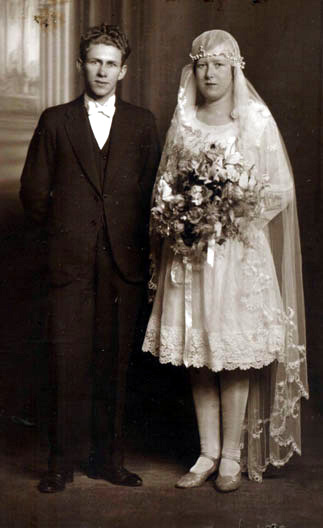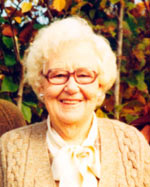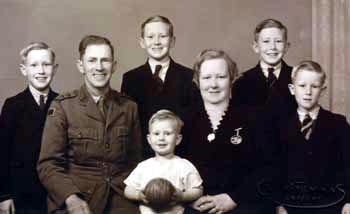Smiley Family History
Jean Smiley 1909-1997
Family line:
Francis Smylie/Smiley 1689 → Hugh Smiley 1723 → William Smiley 1757 → Hugh Smiley 1785 → Shepherd Parkman Smiley 1828 → Thomas Alexander Ward Smiley 1867 → Jean Smiley 1909-1997.
Jean Smiley
Born: 21 February 1909, St Kilda, Vic
Died: 1 December 1997, Melbourne, Vic, age 88
Occupation: Shop assistant, nanny, home duties
Married: John (Jack) Robert Nixon, 11 September 1928, East St Kilda, Vic.
Children: 5

Jean Smiley was the ninth of the eleven children of Thomas Alexander Ward and Marion Harley (Bunn) Smiley.
As her father shifted the family often to cater for his work as a boring contractor, her childhood saw her living in a variety of locations and houses.
Along with others in her family, Jean attended Brighton Road State School at St Kilda. As a young adult, she met a surveyor, John (Jack) Robert Nixon, son of farmer Frederick Daniel Nixon and Lucy Greenslade (Moore) Nixon. Jack had been born in Bet Bet near Maryborough, Victoria, in September 1906.
Jean and Jack married on 11 September 1928 at East St Kilda Congregational Church and initially lived in St Kilda, in the street next to the one where her parents were living [click on photo to see a larger image].
Jack, by now an engineer by profession, joined the Australian Army during World War Two.
Jean, with five young children, moved the family to Red Cliffs and lived close to her sister Jessie and it was during this time (17 July 1942) that Jack was killed in an explosion at Kilcoy, Queensland when on an Army operation.
In her early 30s, Jean moved the family back to Melbourne and bought a home in Service Street, Hampton where she raised her five sons.
She died in Melbourne on 1 December 1997, aged 88.
Children of Jack and Jean (Smiley) Nixon
- Gordon Thomas Nixon (1929-2012)
- Trevor Robert Nixon (1930-2010)
- John Frederick Nixon (1932-2008)
- Barrie
- David (1939-2013)
Further information
- Photographs of Jack and Jean (Smiley) Nixon
- Siblings of Jean Smiley
Reflections of Jean (Smiley) Nixon
The following notes were provided by Jean in the 1980s:

Our home in St Kilda was a two storey house behind the family butcher's shop with a very small asphalt yard to play in. It had a high brick wall and we used to hit balls against it. That brick building was where they made the sausages and corning the meat.
We all went to Brighton Road State School in St Kilda, with Shep and Doug going on to Wesley College on scholarships. I asked Phil about it one day, and he said he could also have gone but he said he was more interested in making things with his hands, and that he wanted to get out and start work.
We last four girls in the family were all very close in friendship and we were all born in the house behind the shop.
Mother used to take us to the beach in summertime. We would go to the old St Kilda salt water baths down at the beach, swim all morning and have some lunch. We would get a tray with a tea pot from the cafe for mother and we would have a bottle of cola beer between us. That was our lunch, and it was a great treat.
And then we would go off to the matinee at the Palais Theatre. Mum loved the pictures and so did we. We must have looked scraggy, our hair was so straight. I would be covered with freckles - my father called them sun kisses - but I never even thought about them.
Mother could see us coming home from school, up Orange Grove, just opposite the shop, and I would be carrying the school bags while the other girls skipped.
Mother thought Dad was working too hard at the shop and should leave. Dad decided to buy a poultry farm at Murrumbeena and we lived out there, and he drove in and out to the shop.
Dad loved his chooks. We thought it marvellous to have a large place to play in. He kept the business but no longer had people knocking at his door Saturday afternoons and Sundays looking for meat. It was amazing that for all the hours he spent in the shop, there would always be someone looking for some meat after the shop had closed. They had very long working days then.
Dad also used to buy and sell houses, and we lived in quite a few - one in Oakleigh, two in Caulfield, two in Westbury Street, one in Talbot Avenue and one in Kent Grove. We thought they were great. One of the Hotham Street houses had stables which we used for playing in. Another one had a tennis court where the church people used to come and play.
One of the houses was in Caulfield and near the tram line and we four younger girls used to go down to gymnasium by tram once a week. The gym was at the East St Kilda Congregational Church. Our sister Jessie had a very dry sense of humour - she was the eldest and so was always given the money to pay our fares. One night on our way home from gymnasium, after getting the tickets, she threw away our three tickets and kept her own. Then an inspector got on and we were all wondering what he would say. Jessie pulled the bell for us to get off at the next stop which was one before our usual stop. I think Jess was off first.
The third house in Hotham Street was designed by Mother and Dad, and they had it built. It was only a short distance from the East St Kilda Congregational Church where we last four girls were married from. We thought it marvellous, as it had an indoor toilet and one outside.
We thought it marvellous living in different homes but as we got older we realised what a lot of packing up mother did. She was a marvellous packer and said the worst things to pack were the washing-up dishes.
I remember when Doris was married, Mother packed the wedding presents. They had only a horse and jinker in those days and when they were driving home, the case with the presents fell out. Fortunately, they had been packed so well nothing was broken.
We played croquet a lot and had a wonderful family life. Both our parents had a good sense of humour and we used to have country visitors staying with us. If a visiting minister was at our church he always came home to our place for lunch.
One Sunday we had a minister home for lunch, and Dad kept saying "Have some more pudding." We knew there was none left, so when we took his plate to the kitchen we got a fit of the giggles. We opened a tin of fruit but no one was game to take it in. Somebody did eventually.
It was nothing for us to sit down with 18 to 20 for tea on Sunday nights; we were all allowed to bring our friends home.
Sunday school picnics were always held on Melbourne Cup Day, the first Tuesday in November. We all had new dresses for it and also for the harvest festival. For the festival, we would have a tiered platform in the church and we would have a higher seat each year, depending on what class you were in. Before we left for picnics, we would have a hymn and a prayer in the church - everyone had to attend that.
We used to go to the picnic in horse-drawn furniture vans. When we were old enough, we were allowed to sit on the tail board of the vans. As soon as the prayer was finished, there was a wild rush to get a seat on the tail board of the van. We used to sing all the way there and back.
Dad always gave the meat for the sandwiches and they were made the night before. Dad did minced corned beef, and we all thought it was great. We always received a yeast bun when we arrived and a drink of cordial. We had races and games and we were usually pretty tired by the time we got home.
Dad's first car was a Metz, and he used to put a box in it to deliver the meat. It had what we called a dickie seat in the back with no cover over it.
The Christmas school holidays were spent at Black Rock. Mother rented a house and would take the four of us down there. The train went only to Sandringham and then we would catch a horse-drawn coach to Black Rock. We had marvellous times at the beach - we all loved the water and if we weren't swimming we were climbing around the cliffs. We knew every inch of them.
Dad, Doris and the rest of the family would come down for weekends. Doris was the bookkeeper in the shop for Dad and she would get meals for him when we were down at Black Rock. Dad wasn't a beach lover but he used to come down sometimes and now and then would have a swim with us. I always remember how white his skin was, especially his legs.
Mother would float and we used to dive under her. Doris was the worrier about us, and Mother used to say "Don't worry about them, turn your back." As we did things together, I think Mother would know one of us would call out if someone got into difficulty.
Some days when the older ones were down, Mother would put a roast on and then one of the boys would go up and bring it onto the beach and we would have it with bread and butter. Boy, did we enjoy it. Sometimes the boys would collect mussels and they would do the same with them.
I can remember the wedding of my sister Doris and Harry Wilson. I was 10 years old at that time. We had new dresses made of silk and we thought we were very glamourous. Unfortunately it was a wet day and Doris' veil was torn with people trying to protect her with umbrellas. We were very excited about the first wedding in our family.
When Doris was married, they lived at Glen Waverley where Harry had an orchard. We loved to go there; we caught the train to Oakbank station and then a horse-drawn coach to Wilsons. When the cherry season was on we were allowed to help pick them but Harry used to say we had to whistle while we worked.
I remember at Bertha and Ted's wedding when Dad made his speech and he said how good it was to see the last girl married as he would be able to spend more time in the bathroom.
When we were young, Dad would look after us while Mother went to night church. We used to make an awful row. Dad was quite oblivious to what we were doing. He would be reading a book and we would turn the kitchen table upside down and use it for a 'boat'. Mother could hear us as soon as she approached the house.
On Christmas eve we would hang up one of Mother's black cashmere stockings and any gift that was big was put on a chair for us. We would be sent to bed early and some of us would decide to see if Santa Claus had arrived. But as the older ones were still up, we were promptly sent back to bed.
Another form of transport at that time were the cable trams; the open part in front was called the dummy and we loved riding there if the weather was good.
Mother and Dad used to go to Tempy in the mallee when Harry and Doris moved there. It was a long trip in the car in those days as not all the roads were made. They would start off early and always carried thermos flasks and food for meals.
One year there, a mouse plague was on. Mother had put her false teeth in a cup beside the bed. When she awoke in the morning, she could hear a rattling - it was a mouse in the cup playing with her teeth. They gave the teeth a good wash with all kinds of things before she would put them in her mouth.
While Harry and Doris lived in Glen Waverley, they had a lot of fruit trees and Doris would make jam for mother. We used to get it in kerosene tins. We got through a lot of jam.
Jack (Nixon) and I married in 1928 and we lived in the next street to Mother and Dad. Jack and I went to Grandma Nixon's home at Berriwillock for Christmas one year when I had only Gordon and Trevor. Unfortunately Gordon became ill with scarlet fever.
Jack had to go back to work so he took Trevor back with him. Bertha and Mother looked after him. They said that when they met Jack at Spencer Street Station there was a grubby little boy. They were steam trains in those days and also he had a cream suit on and that didn't help.

Jack enlisted into the Army from Rupanyup early in 1941 (click on photo for larger picture) and the boys and I moved to Estella Street in Glen Iris because he was in Puckapunyal and we could go visit him at the army camp. Jack embarked for the Middle East in November and later wrote to me suggesting we move to Red Cliffs in case the Japanese bombed Melbourne. At the beginning of 1942 I drove the Pontiac to stay with Jess and Henry at Red Cliffs for a few months. It was rather hectic with 10 children in the house. Jess and I were kept busy feeding them all.
Then we moved to the adjoining fruit block, renting a house from Mr Charles. It was heaven to be on our own and I am sure it would have been for Jess and Henry too. They were very good to us.
I had a free-standing laundry with benches to stand the tubs on and a copper in the corner. It was open to the cold in the winter. Henry used to fill the tubs for me - only cold water, and wasn't it cold in winter time.
Clara also came to live in Red Cliffs with her three children. Henry had arranged with a friend of his, a Mr Wright, to rent her a house next door to his. It was on the opposite side (the western side) of the railway to us and quite near the shops.
We were two miles from the town and John and Barrie went to Red Cliffs East School and Gordon and Trevor went to Red Cliffs Central School in 1942. The next year Gordon and Trevor went to Mildura High School, riding their bikes into Red Cliffs and catching a bus from there.
Jack came back to Australia in March 1942 and got leave in April, and we went to the Red Cliffs station to meet him - the five boys and I. What a reunion that was - I think he had a fortnight's leave.
While living at the Charles' house, I worked for Henry, tying on the vines (wrapping on). When I first started the wrapping on, the vines seemed to go such a long way. But I would get the boys off to school, do my house work and take David down to Jess who would mind him. It was very cold, particularly on those days with a heavy frost. I always had morning tea and lunch with Jess and Henry.
I would also drive the tractor while Henry worked the silly plough. The first time I was to drive the tractor he just said "You drive a car, hop on." I think he did explain a few things.
When living at the Charles house, one day we ran out of water and so we switched over to a reserve tank but after a couple of days we didn't think the water tasted very nice. The boys got up and had a look and there was a dead cat floating around the tank. We didn't drink any more water.
On 18 July 1942, one of the Dadswell children came to our house to tell me there was a phone call for me at Jess and Henry's. I didn't have a phone. I walked the quarter of a mile to take the call and was told by the telephonist my husband had been killed the previous day.
After a few months, I went to Melbourne and looked for a house. And that is when I bought the property at 34 Service Street, Hampton, where the boys and I lived while they grew up.
I supplemented my war widows pension by doing some paid work as a 'nanny' and I also worked as a shop assistant in my brother-in-law Mac's watchmaker's business.